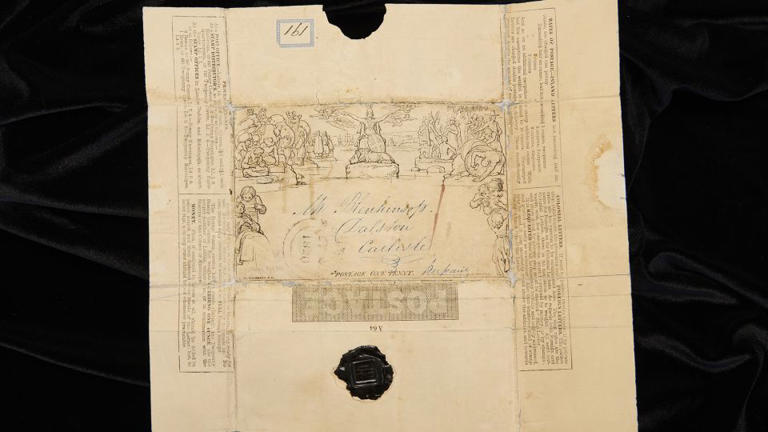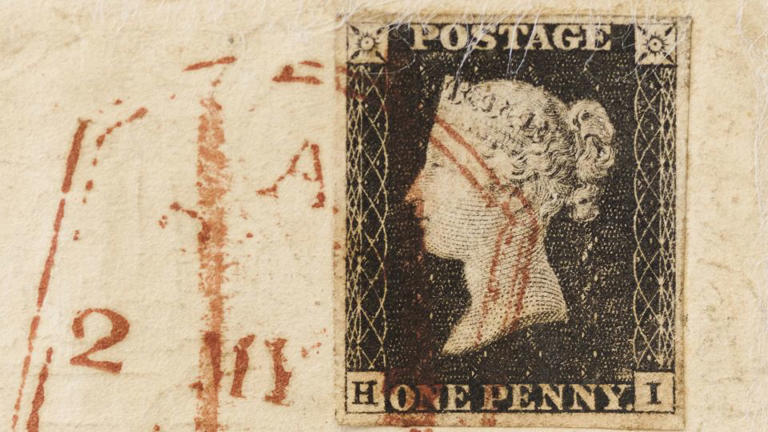Story by By Issy Ronald, CNN •
The first known piece of mail sent using a prepaid stamp — “one of the greatest leaps forward in human communication” — could fetch between $1.5 million and $2.5 million when it comes up for auction at Sotheby’s in New York next month.
If the piece realizes its estimate, Sotheby’s said it would become one of the most valuable pieces of postal history to have ever been auctioned
Dated May 2, 1840, the letter’s original recipient was William Blenkinsop Jr., the 35-year-old manager of a Victorian iron works in Bedlington, a town in the north of England. Sotheby’s state that all that’s known about the letter’s sender is that they posted the missive in London — about 300 miles to the south — and paid for it with the Penny Black stamp.

The envelope was resent as a Mulready. - Sotheby's© Provided by CNN
After receiving the letter, Blenkinsop Jr. turned the envelope inside out and refashioned it as a “Mulready” – an ornate wrapper embellished with images representing the British Empire that acted as another method of prepaid payment introduced at the same time as the Penny Black.
That second envelope reached a Mr. Blenkinsop, most likely his father, who lived 75 miles away in Dalston, Carlisle and kept it, although the contents of both letters themselves have been lost.
“Surviving over 180 years, the ornate Mulready envelope sealed with a Penny Black revolutionized the way people from all walks of life correspond, exchange ideas, share news and express themselves,” Richard Austin, Sotheby’s Global Head of Books & Manuscripts, said in a statement.
“At the dawn of the AI age, this remarkable object speaks to our innate human desire for connection and the ways in which it has evolved to new heights in the two centuries since.”

The Penny Black stamp revolutionized the postal service. -
Sotheby's© Provided by CNN
Both sides of the envelope still bear the stamped dates on which they were sent, the first on May 2, 1840 and the second on May 4, two days before the official start date of the Penny Black.
Teacher and social reformer Sir Rowland Hill conceived the idea for the Penny Black, the world’s first adhesive stamp, to standardize the complex, expensive and unpredictable postal rates at the time, that were paid for by the recipient.
The system was unwieldy for both those using it and the postal service, who could sometimes not recover the costs of delivering items if the person receiving them did not pay.
While the stamp was wildly successful and subsequently adopted worldwide, the Mulready envelope was withdrawn after it was ridiculed by the public.
For more CNN news and newsletters create an account at CNN.com
Both sides of the envelope still bear the stamped dates on which they were sent, the first on May 2, 1840 and the second on May 4, two days before the official start date of the Penny Black.
Teacher and social reformer Sir Rowland Hill conceived the idea for the Penny Black, the world’s first adhesive stamp, to standardize the complex, expensive and unpredictable postal rates at the time, that were paid for by the recipient.
The system was unwieldy for both those using it and the postal service, who could sometimes not recover the costs of delivering items if the person receiving them did not pay.
While the stamp was wildly successful and subsequently adopted worldwide, the Mulready envelope was withdrawn after it was ridiculed by the public.
For more CNN news and newsletters create an account at CNN.com
No comments:
Post a Comment